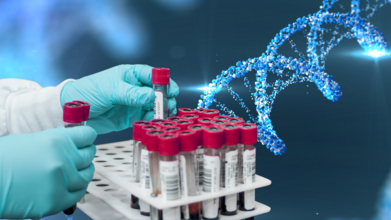- Health Conditions A-Z
- Health & Wellness
- Nutrition
- Fitness
- Health News
- Ayurveda
- Videos
- Medicine A-Z
- Parenting
- Web Stories
RFK Hires Autism Skeptic To Look Into CDC Autism Data

Credits: MedPageToday
Dr. David Geier, a controversial orthopedic surgeon and known vaccine skeptic, is attempting to revisit long-debunked claims linking vaccines to autism. Recently hired by Health Secretary Robert F. Kennedy Jr., Geier is now reviewing historical safety data to investigate whether government agencies concealed crucial information.
Accessing CDC's Vaccine Safety Database
Geier is reportedly seeking access to the U.S. Centers for Disease Control and Prevention’s (CDC) Vaccine Safety Datalink (VSD), a repository of vaccine safety records from millions of patients. The VSD is maintained by a dozen major healthcare systems, each controlling its own data. Full access has always been tightly controlled due to privacy and misuse concerns.
Geier previously accessed the database in 2004 and 2006. However, according to The Wall Street Journal, CDC officials revoked his access both times, alleging he had misrepresented his research intentions.
Despite this, Geier is once again pushing to analyze the data. It remains unclear if access has been granted. A spokesperson for the U.S. Department of Health and Human Services (HHS) stated that the department intends to take a “fresh look at all data including old data,” and emphasized that they would “follow the science—wherever it leads.”
Scientific Community Raises Concerns
The scientific and public health communities have expressed concern over Geier's involvement. “He has no record in the scientific community of doing valid work,” said Dr. Walter Orenstein, former director of the CDC’s immunization program.
Geier and his late father, geneticist Mark Geier, have long promoted the theory that vaccines cause autism—an idea widely discredited by the medical community. The pair also introduced a controversial treatment using hormone-blocking drugs, which resulted in the revocation of Mark Geier’s medical license and disciplinary actions against David Geier for practicing medicine without a license.
At a 2015 conference, Geier defended his position, claiming the scientific community dismisses their findings without proper consideration. “They think that [the vaccine's link to autism has] been completely debunked,” he said at the time.
Kennedy's Role and the Larger Context
Robert F. Kennedy Jr., a vocal critic of vaccine mandates, has clarified that Geier will not lead autism research. Instead, his focus will be on identifying any possibly overlooked or hidden data within the CDC’s database.
“There has been a lot of monkey business with the VSD,” Kennedy stated in a previous congressional appearance.
Kennedy, who once authored a now-retracted Rolling Stone article alleging a vaccine-autism cover-up, cited a 2000 CDC conference that explored preliminary data on thimerosal—a mercury-based preservative once used in vaccines. Though early findings prompted questions, later analysis confirmed no link between thimerosal and autism. Thimerosal was removed from most vaccines in 2001, and final results were published in 2003.
Exploring Autism Causes and Rising Rates
While Geier conducts his review, the U.S. Department of Health and Human Services is separately examining rising autism rates. The CDC now estimates that 1 in 31 eight-year-olds in the U.S. were diagnosed with autism in 2022. Experts attribute the increase to a combination of better diagnostic methods, genetic factors, and increased awareness.
The National Institutes of Health (NIH) also plans to fund research into other possible causes, such as environmental toxins and diet. Meanwhile, Children's Health Defense, a nonprofit formerly led by Kennedy, is hosting an online event this week centered on what it calls the “autism cover-up.”
Sharp Rise in STEC Infections Across England: Public Urged to Step Up Hygiene Measures

If your stomach has been feeling off lately, you are not alone, and it may not just be last night’s dodgy takeaway to blame. The UK Health Security Agency (UKHSA) has flagged a worrisome 26 per cent jump in Shiga toxin-producing E. coli (STEC) infections across England in 2024. This is not your average upset tummy. STEC is a notorious bacterial bug that can pack quite a punch and even turn deadly in rare cases.
Let us break down what is going on inside your gut and why everyone from toddlers to travellers is being warned to tread carefully.
What is STEC?
STEC is a group of Escherichia coli bacteria that produces Shiga toxins, which are notorious for triggering gastroenteritis, meaning diarrhoea, stomach cramps, vomiting and dehydration. While many cases clear up without a fuss, some can spiral into a severe, potentially fatal condition called haemolytic uraemic syndrome (HUS), which mostly targets the kidneys.And just how bad is the situation? In 2024, England clocked 2,544 confirmed cases, up from 2,018 in 2023. Of these, 564 were the O157 variety, the usual suspect in previous years, and 1,980 were of other non-O157 strains, which are fast becoming the new troublemakers.
Why Toddlers Are Most at Risk
Kids aged one to four seem to be prime targets, with 84 O157 and 273 non-O157 cases reported in this age group alone. Why? Their tiny immune systems are still learning the ropes, their hygiene habits are a work in progress, and they will touch anything.When Holidays Come With a Side of Bacteria
If you are planning a sunny getaway, be warned. Travel-related cases of STEC saw a whopping 60 per cent leap this year. Whether it is due to changing travel patterns or better reporting, it is a reminder that good hygiene does not take a holiday. Washing hands thoroughly, avoiding questionable street food and keeping your water clean can go a long way when you are overseas.How It Spreads
STEC bacteria are quieter than you would expect. You can catch them from undercooked meat, contaminated fruit or veg, untreated water, or simply touching surfaces that carry the bug. They also jump from person to person, especially in households or nurseries where handwashing might be more ‘meh’ than meticulous. And animals can be carriers too. Visiting children’s farms without properly washing up afterwards? You could be in danger.2024’s Biggest Outbreak
Of the five outbreaks that UKHSA tracked this year, the worst offender was salad leaves. One salad-linked outbreak caused 293 infections across the UK, hospitalised 126 people, led to 11 HUS cases, and tragically took two lives. Fresh produce like fruit and salad may seem harmless, but if they are not washed or stored properly, they can become a microbial minefield.Deaths, Detection and a Worrying Trend
Seven people died from STEC in 2024 – two from O157 and five from non-O157. The non-O157 group has seen a near tripling in cases since 2019. Why? More accurate testing methods like PCR have brought many cases to light that previously went undetected. So, the increase is not just because bacteria are getting braver; we are also getting better at spotting them.What Can You Do?
The best defence is good old-fashioned hygiene. Wash hands with soap and hot water, especially after playing outside, handling animals, or using the loo. Use bleach-based cleaners on surfaces and do not cook for others if you are sick or for 48 hours after symptoms ease. If there is blood in your stool or you are severely dehydrated, it is time to ring the GP.Meanwhile, according to the reports, it is recommended that everyone follow the “4Cs” of food hygiene: chilling, cleaning, cooking, and avoiding cross-contamination. And if you are eating out, check hygiene ratings before you tuck in.
Eating More Ultra-Processed Foods Linked to 41% Higher Lung Cancer Risk, Study

Ice cream, breakfast cereal, and that quick-fix instant noodle packet might save a lot of your time and satisfy your taste buds. But a growing body of research suggests they may be doing more harm than just expanding your waistline. A new study has drawn a strong link between eating ultra-processed foods (UPFs) and a significantly higher risk of developing lung cancer.
Here is what you need to know about the findings and whether your daily diet might be putting your lungs at risk.
The study, led by Chinese researchers and published in the medical journal Thorax, tracked the health and food habits of over 100,000 American adults, with an average age of 63, for around 12 years. Using detailed dietary questionnaires, researchers zoomed in on the intake of UPFs, which include all your guilty pleasures: cakes, cookies, soft drinks, frozen pizzas, hot dogs, margarine, sugary cereals, and yes, even your beloved salty snacks.
Participants consumed anywhere between half a serving to six servings of these foods daily, with the average landing at nearly three servings a day. Lunch meats and soft drinks came out on top as the most commonly consumed items.
Also Read: Can Potatoes Help Control Obesity? Researchers Say Yes; Know Why, How and More
By the end of the study, 1,706 participants had developed lung cancer. When researchers compared diets, a disturbing pattern emerged: those who ate the most UPFs had a 41 per cent greater chance of developing lung cancer compared to those who ate the least.
It is Not Just About Smoking
Naturally, the study controlled for smoking status, an obvious and major risk factor for lung cancer. But the researchers admit they could not account for smoking intensity, a variable that could skew results. Still, the pattern remained strong even when separating out different lung cancer types, including both small cell and non-small cell variants.
Reports say that a quarter of lung cancer cases occur in non-smokers, and this highlights the need to explore other possible triggers, including diet.
However, the study is not airtight. Dietary habits change a lot over 12 years, and participants only logged their UPF intake at the start.
What is the Study Actually Saying?
The study’s authors are not claiming that UPFs cause lung cancer. But the association is strong enough to spark concern. They say global efforts to cut back on ultra-processed foods could be an effective way to reduce lung cancer cases, especially among non-smokers.
They are not wrong. While the direct line between a cupcake and a cancer cell has not been proven, UPFs are already known to contribute to obesity, heart disease, type 2 diabetes, and even depression. Adding lung cancer to the list, even with some scientific caveats, raises the stakes for rethinking what is on your plate.
Vaping May Be Rising, But Smoking Is Falling
On a related note, separate research from the University of Michigan offers a silver lining: teenage smoking is on the decline. Tracking data on 16- and 17-year-olds in Britain from 1974, 1986, and 2018, the study showed a drop from 33 per cent to 12 per cent in teen smoking. But in 2018, 11 per cent of teens reported using e-cigarettes instead.
That is still a win in the long-term fight against lung cancer, but it also makes lifestyle-related risks like diet more significant. If fewer people are smoking, then other contributors to lung cancer, like poor nutrition, could become even more important to understand.
Should You Panic or Not?
The science is not settled, and researchers are being cautious. Still, the message is clear: even if you have never lit a cigarette in your life, what you eat might be silently setting off alarms in your body.
While more studies are needed to confirm causation, this new research adds to a growing chorus warning us about the dangers of overly processed meals. You do not need to quit cake completely, but maybe it is time to take care of your lungs more by making better food choices.
Why Are Only Certain People At Risk Of Developing MS? World's First Study Aims To Crack The Code

Credits: Canva
Multiple sclerosis (MS) remains one of the most complex neurological conditions with no known cure. Affecting over 33,000 Australians and 2.8 million people globally, MS continues to baffle scientists and clinicians alike. While environmental factors, genetics, and viral infections have all been linked to MS, no single cause has been confirmed.
Now, a world-first study from the University of South Australia may finally crack part of the code. For the first time, researchers are using a genetic selection method called recall by genotype to understand why some people exposed to the same virus go on to develop MS while others don’t.
At the heart of the study is a long-suspected culprit: the Epstein-Barr virus (EBV), best known for causing glandular fever. More than 90% of the global population gets infected with EBV at some point. Yet only a small fraction develop MS. That’s where the mystery lies- how can one virus lead to a life-altering autoimmune disease in a select few?
Dr. David Stacey, who leads the study, believes the answer may lie in our genes. “It’s like studying the immune system’s blueprint before the disease starts,” he said. The goal is to identify how individuals’ genetic make-up alters their immune response to EBV—and whether that difference tips the scale toward developing MS.
What Is the ‘Recall by Genotype’ Approach?
This isn’t just another observational study. The team is using an innovative approach known as recall by genotype, a first in MS research. In simple terms, they’ll analyze the DNA of more than 1,000 participants who have never been diagnosed with MS. These individuals will then be grouped into high-risk and low-risk categories based on their genetic predisposition to MS.
From there, researchers will compare how the immune systems in these two groups respond to EBV exposure.
“By grouping people based on their genetic profile, we expect to find those with a high genetic risk for MS will also show biological differences—even if they don’t have the disease,” explained Dr. Stacey.
This could help pinpoint biomarkers—early warning signs in the body that MS may be developing long before symptoms appear.
Why This Study Could Be a Game-Changer?
MS is a central nervous system autoimmune disorder. It causes the immune system to attack the protective sheath covering nerve fibers, resulting in symptoms like fatigue, muscle weakness, poor coordination, vision problems, and cognitive changes. But the progression of the disease is highly unpredictable.
This study, funded by MS Australia’s Incubator Grant program, aims to do more than just explain risk. It could transform the way we approach MS—shifting from reactive care to proactive detection and even prevention.
“If we can identify biological markers before symptoms begin, that opens up new possibilities for early interventions or therapies that could delay or stop disease progression altogether,” said Dr. Stacey.
Does High Genetic Risk Mean Someone Will Develop MS?
With genetic research comes another layer of complexity: how much risk information should be shared with participants? Dr. Stacey acknowledges that just because someone has a high genetic risk doesn’t mean they’ll definitely develop MS. That brings up ethical and legal challenges. “If we identify people who are at risk of developing MS, we need to consider how—and whether—to share that information, particularly as it may not yet be clinically actionable,” he said.
Part of the study will address these questions and help lay the groundwork for responsible, patient-centered practices in future genetic research.
While this study is based in Australia, its implications are far-reaching. MS is a leading cause of neurological disability among young adults worldwide. The hope is that by identifying the biological chain of events leading to MS, scientists can develop tools that apply globally—regardless of geography, ethnicity, or background.
According to Rohan Greenland, CEO of MS Australia, “Our mission is to accelerate research and improve outcomes for every person living with MS.” This project exemplifies that vision by targeting the earliest stages of the disease—before symptoms even appear.
If the pilot is successful, it will inform a much larger, more ambitious study. Researchers plan to refine how genetic risk scores are calculated, validate their findings across diverse populations, and develop standardized operating procedures for similar studies worldwide.
This could also inspire studies into other autoimmune conditions like lupus or type 1 diabetes, where viral triggers and genetic susceptibility are believed to intersect.
The world's first “recall by genotype” study in MS research is underway in Australia. By linking genetic risk to immune response against the Epstein-Barr virus, scientists aim to answer a longstanding medical mystery: why only some people develop MS. The findings could pave the way for earlier detection, targeted therapies, and ethical frameworks for sharing genetic information—all with global implications.
© 2024 Bennett, Coleman & Company Limited

